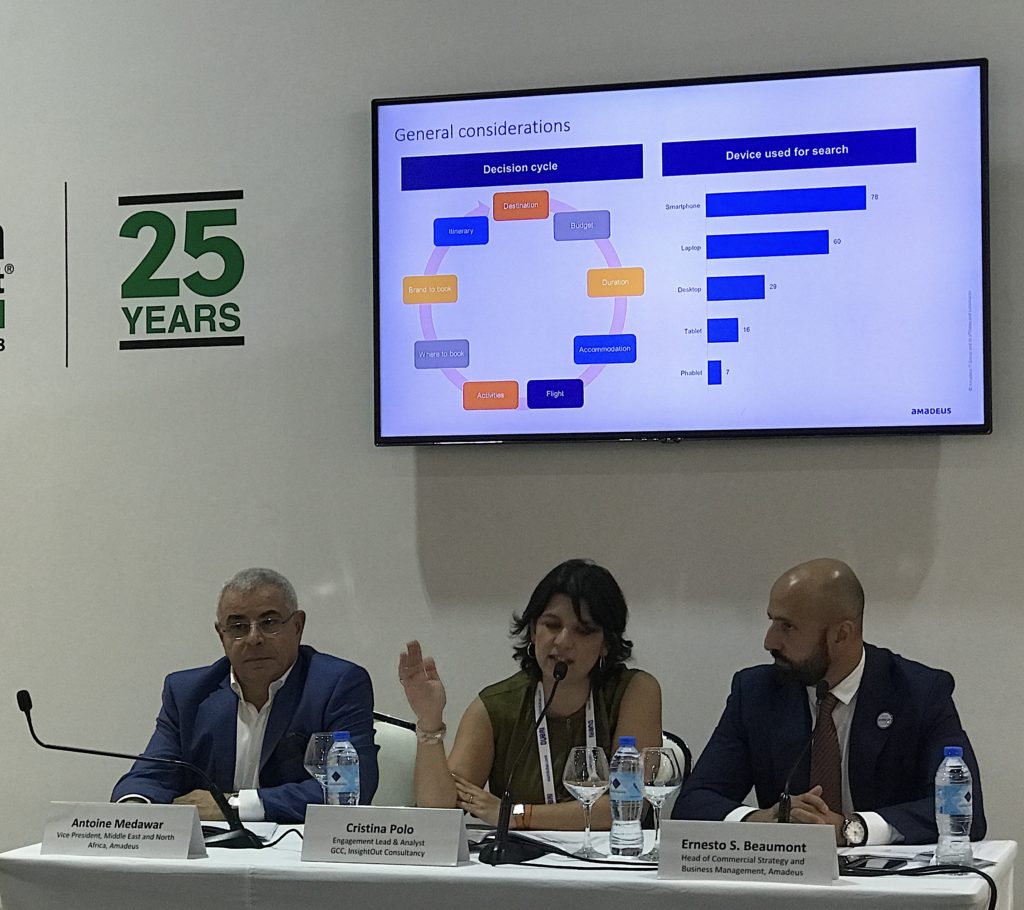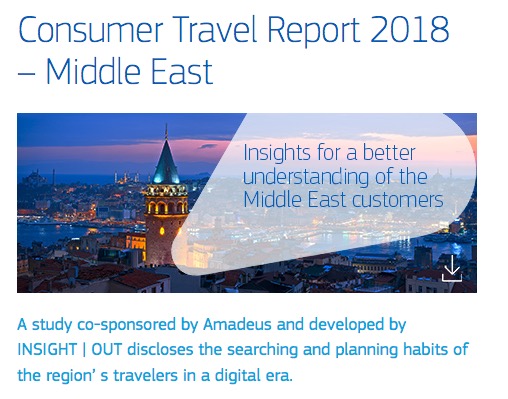
23 Apr, 2018
Amadeus Middle East travel report: Women key decision-makers, social media influencers faces trust challenge
Dubai – April 23, 2018: The ‘Middle East Consumer Travel Report 2018’, a study co-sponsored by Amadeus and developed by InsightOut Consultancy, has identified the following six key trends shaping the Middle East market:
1) Travel sellers need to adopt consultative approach to package clients’ requirements, within designated budget
2) The leading role of women should be recognized by travel sellers and they should be targeted
3) Travel sellers should focus on better communicating packages, to overcome negative perception that they’re difficult to customize and not personalized
4) Promote active-awareness through social media sharing: Instagram, Snapchat & YouTube lead the pack in Middle East
5) Travel seller campaigns need to focus on the Mobile channel
6) Target the travelers’ potential surrounding groups when planning campaigns
(+) Influence from friends/family/colleagues is more impactful than search-engine reviews
(+) Enhance trust through friends/family/colleagues feedback as opposed to potentially biased social media influencers.

Cristina Polo, General Manager, InsightOut Consultancy (centre) flanked by Amadeus executives Antoine Medawar (left) and Ernesto Beaumont (right)
The full text of the media release follows below:
While the Middle East remains a region that loves to travel, a new study suggests that the search for value plays a decisive role in how today’s travellers research, compare and book their journeys in this part of the world. Unveiled during this week’s Arabian Travel Market 2018, the ‘Middle East Consumer Travel Report 2018’ — a study co-sponsored by Amadeus and developed by InsightOut Consultancy — explores searching and planning habits of the region’s travelers in a digital era.
The report acknowledges that the Middle East travel market is incredibly diverse when it comes to travel patterns, yet cost is a shared consideration across countries. Cost is cited most often by travellers (50%) as the first consideration when selecting their accommodation — more important than hotel location, classification, or rating. Similarly, almost half of travellers (46%) cite budget as a main factor when choosing flights, more so than airline reputation and even the itinerary. As a result, one in three (33%) travellers today “actively search” for discounts online during the shopping process.
While value is a key driver in travel decisions, consumers in the Middle East are open to being influenced when searching for their destination. However, the expectations from traditional travel advisors are changing: most travelers now visit a travel site or agency when they are ready to book, not when they are still planning their trip.
More people admit to being more influenced by friends, family and colleagues (53%) than by search engines and review sites (47%) or actual travel agents (31%). The research paper confirms that more travellers in the Middle East today will compare elements such as flights by themselves online (45%), instead of going to a travel agent to compare similar products and services (34%). Similarly, 64% of corporate travelers prefer to search, book and pay online for business trips; more than those who depend on their company or a travel agent (30% and 6%, respectively).
In a region where value is paramount, it is surprising that travel packages are generally not seen as an attractive way to find value when booking. Only 16% of the study’s respondents indicated that they book multiple components — flight, hotel, activities — in a package bundle. Yet once again, when a package bundle is booked, cost is the number one reason, more so than convenience or being inspired by travel packages on offer.
Some of the report’s main recommendations for the travel sector in the Middle East include:
- Travel sellers need to adopt a consultative approach to packaging clients’ requirements within designated budgets. Travelers understand the value of packages but want the freedom to customize these to suit their journey.
- Travel sellers should focus on better communications for packages and their value, in order to overcome the negative perception that they are difficult to tailor and just an up-sell of services.
- Travel sellers should reconsider traditional channels of influence with a focus on gaining positive endorsements from consumers directly, rather than through paid media or paid social influencers.
- Travel sellers’ marketing campaigns should focus on mobile channels that promote active awareness and involvement, rather than static offline communications that are now marginal and more related to passive awareness.
Antoine Medawar, Vice President, Amadeus MENA, commented: “By better understanding the key moments of truth throughout the customer journey, the region’s travel industry can shape even smarter, more attractive services in a competitive global marketplace. Consumers all want a personalized and fulfilling travel experience, and travel companies need to be able to deliver value throughout that experience. This is where technology in particular will play a crucial role in keeping the Middle East travel sector moving forward.”
“Technology has completely changed the way we research and book travel. In the Middle East, that has empowered individuals to have more control of their trips. This has placed additional pressure on the travel sector community to offer products that meet customers on their own terms, considering that demographics have become the game changer in this region,” said Cristina Polo, General Manager, InsightOut Consultancy.




Liked this article? Share it!